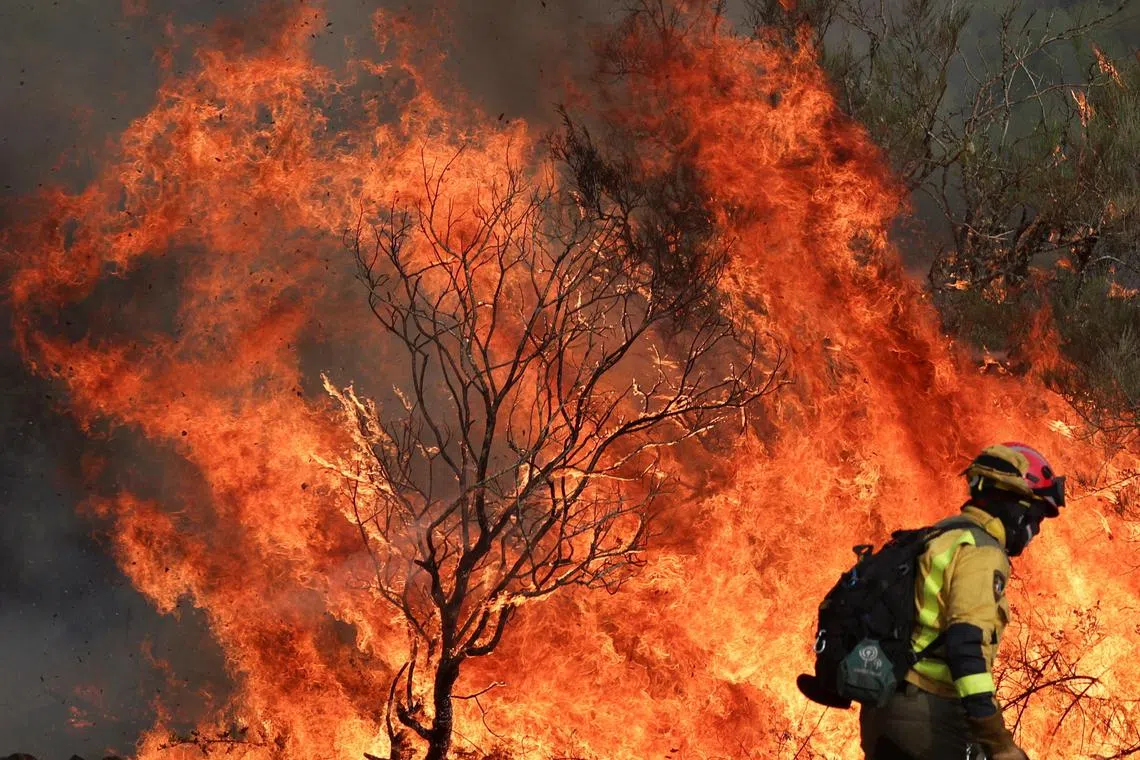3 killed in European wildfires as heatwave intensifies with above 40 deg C temperatures expected
Sign up now: Get ST's newsletters delivered to your inbox

A firefighter battling a wildfire in the village of Parafita in Spain on Aug 12.
PHOTO: REUTERS
MADRID – Three men died and thousands were forced from their homes on Aug 12 as wildfires fuelled by a heatwave scorched southern Europe.
Heat alerts were issued in Italy, France, Spain, Portugal and the Balkans, with temperatures expected to soar above 40 deg C.
The heatwave is another sign of climate change, which is fuelling longer, more intense and increasingly frequent bouts of extreme heat.
“Thanks to climate change, we now live in a significantly warmer world,” Dr Akshay Deoras, a research scientist at the meteorology department in Britain’s University of Reading told AFP, adding that “many still underestimate the danger”.
An employee of a Spanish equestrian centre died from his injuries in Tres Cantos, a wealthy suburb north of Madrid, officials said – reportedly as he tried to save horses.
Later, officials in Castile and Leon in north-western Spain confirmed another man had been killed while fighting fires.
And a soldier in the Balkan country of Montenegro died and another was seriously injured when their water tanker overturned while fighting wildfires in the hills north of the capital, Podgorica.
A child died of heatstroke
The equestrian centre employee was the first person to die from dozens of wildfires that have hit Spain since a heatwave began last week.
Hundreds of residents of Tres Cantos fled from the fast-moving blaze, which was contained on the morning of Aug 12.
Spanish Prime Minister Pedro Sanchez said on X that rescue services were “working tirelessly to extinguish the fires” and warned: “We are at extreme risk of forest fires. Please be very cautious.”
Saved at the ‘last second’
Elsewhere, about 2,000 people were evacuated from hotels and homes near the popular beaches of Tarifa in Andalusia, southern Spain.
The wildfire broke out near where a similar blaze forced evacuations earlier in August.
Mr Antonio Sanz, the Andalusia region’s interior minister, said: “We managed to save the residential area at the very last second.”
In Castile and Leon, dozens of blazes were reported, including one threatening Las Medulas, a Unesco World Heritage site known for its ancient Roman gold mines.
The head of the regional government of Castile and Leon, Mr Alfonso Fernandez Manueco, vowed “to act quickly and generously” once the fire is over to restore the site “to its full glory as soon as possible”.
In neighbouring Portugal, firefighters battled three large wildfires, with the most serious near Trancoso in the centre of the country.
More than 700 firefighters were deployed there.
Church bells rang out on the morning of Aug 12 in Mendo Gordo, a hamlet near Trancoso, to sound the alarm as a thick column of smoke rose in the distance, images broadcast on Portuguese television showed.
Smoke and greenhouse gas emissions related to forest fires since the beginning of summer in the Northern Hemisphere are among the highest ever recorded, according to the European Union climate monitor Copernicus.
‘Too hot’
Temperature records were broken at four weather stations in southern France on Aug 11 and three-quarters of the country was under heat alerts on Aug 12, with temperatures forecast to top 40 deg C in the Rhone Valley.
The Rhone department banned outdoor public events.
Temperatures started rising on Aug 8 in France’s second heatwave in just a few weeks and could remain high into next week, according to the national weather office Meteo-France.
That would make it a 12- to 14-day stretch of extreme heat.
“It’s already too hot,” said Mr Alain Bichot, 34, as he sat at a cafe terrace early on the morning of Aug 12 in Dijon in eastern France.
“I would rather just go to the office. At least there is air-conditioning there.”
Eleven Italian cities, including Rome, Milan and Florence, were placed on red alert on Aug 12 due to the heat.
In Montenegro, fire crews aided by military personnel were fighting a blaze around Podgorica for a second day when the water truck flipped, killing the soldier, the defence ministry said in a statement.
The authorities warned residents to stay indoors due to smoke from a forest fire raging in the hills above Podgorica.
Hundreds of soldiers and firefighters were also battling wildfires in Albania, while Greece has requested EU assistance to battle more than 100 wildfires stoked by fierce winds and dry conditions on its territory.
Athens has requested four water bombers from the EU Civil Protection Mechanism after evacuating 20 villages in the Achaia region.
More than half (52 per cent) of Europe and the Mediterranean basin was hit by drought in July for the fourth consecutive month, according to an AFP analysis of European Drought Observatory data.
Drought levels in the region are the highest on record for the month of July since data collection began in 2012, exceeding the 2012 to 2024 average by 21 per cent. AFP


